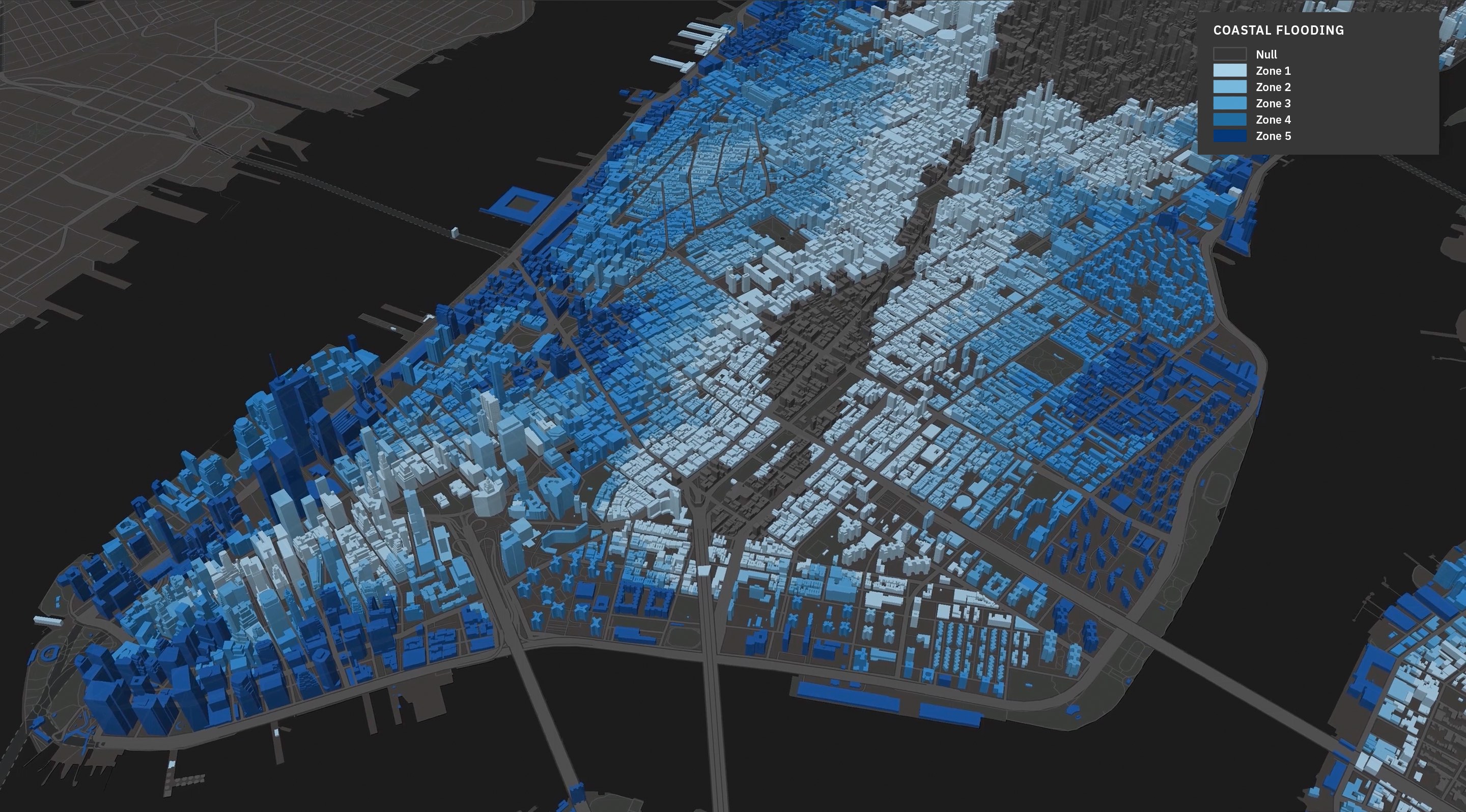the new school's urban systems lab, city of new york, climasens and partners launch development climateiq, an ai-enabled, urban climate risk toolFunded by Google.org and with technical support from a team of Google employees, the tool will help decision makers understand current and future climate risks |
New York, September 13, 2023—According to a study from the World Meteorological Organization, on average, a disaster related to a weather, climate or water hazard has occurred daily over the last half century– killing 115 people and causing US$ 202 million in losses every day. As extreme weather events accelerate causing devastating impact on cities and towns across the globe, decision-makers across all sectors and scales need advanced tools to prioritize effective climate adaptation and resilience investments, especially to protect the most vulnerable. Today, The New School’s Urban Systems Lab is announcing the continued development and scaling of ClimateIQ, an Artificial Intelligence (AI) powered climate risk evaluation tool built on multiple urban climate hazard models. The ClimateIQ team is proud to partner with the City of New York as the inaugural partner city to test and validate the AI modeling environment. The development of ClimateIQ is being led by Dr. Timon McPhearson at The New School’s Urban Systems Lab and a team of scientists and designers. This stage of development is being funded through a $5M award from Google.org’s Impact Challenge on Climate Innovation, a commitment from the tech company’s philanthropy to fund six big bet projects that accelerate technological advances in climate information and action. Google.org is exploring ways to support this project with technical assistance through a Google.org Fellowship which could include help from a team of Google researchers, designers, product managers and software engineers to develop ClimateIQ with the City of New York and for the benefit of multiple subsequent cities. Given the diversity and quality of available data through the NYC Open Data portal, and Urban System Lab’s experience modeling heat and flood risk in NYC, the partnership will build on the continued engagement with Mayor’s Office of Climate and Environmental Justice – most recently through the Climate Vulnerability, Impact, and Adaptation Analysis project and the New York Panel on Climate Change (NPCC) – to help validate and provide feedback on the AI tool as it is developed, trained, and tested. The New School will compare results with existing flood and heat risk model outputs for NYC and the City will review both the process and outcomes of the machine learning approach to generate faster and higher resolution future climate risk information for the City. Outputs from ClimateIQ will include extreme heat, flood, drought and air pollution exposure maps displayed on a publicly accessible, interactive dashboard for communities and decision-makers to use for planning, emergency response, and to prioritize climate adaptation investments. With these maps, city officials and communities will be able to better plan where to invest in shade structures to reduce heat exposure and pinpoint locations to enhance hard and nature-based coastal infrastructure to reduce impacts of flooding. It will also allow stakeholders to view climate risk information that accounts for potential multiple interacting hazards that may affect their neighborhoods, such as how extreme heat and air quality intersect to exacerbate health risks. ClimateIQ’s aim is to drive innovation in climate risk assessment using the latest models, data, and advances in AI to provide communities with the high resolution data needed to understand current and future climate risks, particularly in the most impacted communities. The team will also work closely with additional city partners including in Phoenix, Berlin, Barcelona, Melbourne and multiple other cities to ensure the AI engine learns from, and works for, cities and towns in diverse climate conditions, geographies, and urban development contexts. ClimateIQ’s team brings together a diverse group from the public and private sectors, including partnerships with ClimaSens, the innovative climate tech start-up based in Melbourne, experts from the Beijer Institute of Ecological Economics (at the Royal Swedish Academy of Sciences), and the Stockholm Resilience Centre (Stockholm University, Cary Institute of Ecosystem Studies and the Virginia Climate Center at George Mason University, as well as with our partner cities to co-develop, test, and validate our approach. Victoria Cerullo, NYC Mayor’s Office of Climate and Environmental Justice (MOCEJ): “We look forward to continuing to work with our partners at the New School Urban Systems Lab and Google.org as they embark on this innovative initiative. ClimateIQ has promised to help the City and our community partners better visualize and anticipate climate impacts affecting our City, now and into the future. The ability to plan for how climate challenges will impact all parts of the City is vital for developing equitable policies to protect all New Yorkers, especially those most vulnerable to climate change.” Joe Glesta, ClimaSens CEO: “ClimateIQ is more than an innovation; it’s a realization of ClimaSens’ mission to equip communities with the tools they need to navigate a complex climate landscape. By marrying advanced analytics with a human-centric approach, we’re creating pathways for informed decision-making and targeted resilience planning. This isn’t just about technology; it’s about empowering people to take control of their future.” Kevin Brege, Google.org: “Sea-level rise, social vulnerability, extreme weather and loss of coastal ecosystems pose new threats to urban communities globally, but governments and community leaders don’t always have the tools they need to make the best use of limited preparedness resources. By leveraging the power of AI, ClimateIQ will enable cities and communities to anticipate emerging threats, prioritize equitable adaptation strategies, and improve risk assessment, planning and emergency response.” Krista Milne, Melbourne Co-Chief Heat Officer: “This partnership marks a significant step towards creating more resilient cities around the world. We look forward to exploring the expansion of this innovative multi-hazard risk pilot to Melbourne – to help us better understand and mitigate the risks posed by climate change, such as flooding, drought and extreme heat and ramp up our ongoing efforts to future-proof our city for generations to come.”Victor Galaz, Beijer Institute of Ecological Economics and Stockholm Resilience Centre: “Climate change, the erosion of resilience, and social vulnerabilities pose serious challenges to the wellbeing of urban communities all over the world. We are excited to explore to what extent responsible uses of AI can augment risk analyses, and help communities innovate and build resilience to a more turbulent climate future. |
|
Founded in 1919, The New School was established to advance academic freedom, tolerance, and experimentation. A century later, The New School remains at the forefront of innovation in higher education, inspiring approximately 10,000 undergraduate and graduate students to challenge the status quo in design and the social sciences, liberal arts, management, the arts, and media. The university welcomes thousands of adult learners annually for continuing education courses and public programs that encourage open discourse and social engagement. Through our online learning portals, research institutes, and international partnerships, The New School maintains a global presence. |
 |
MARKETING AND COMMUNICATION |
| 79 Fifth Avenue New York, NY 10003 www.newschool.edu |
PRESS RELEASE |
Media Contacts: Merrie Snead, Follow @TheNewSchool |
|
|
